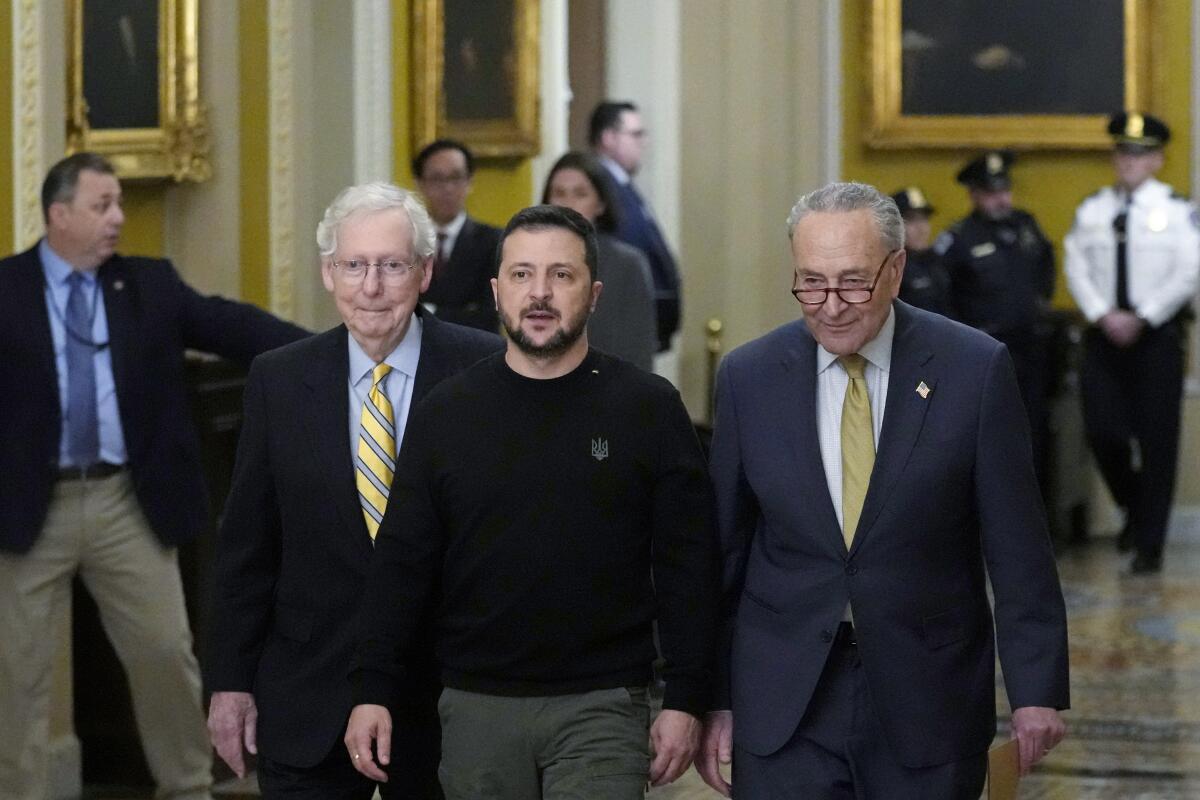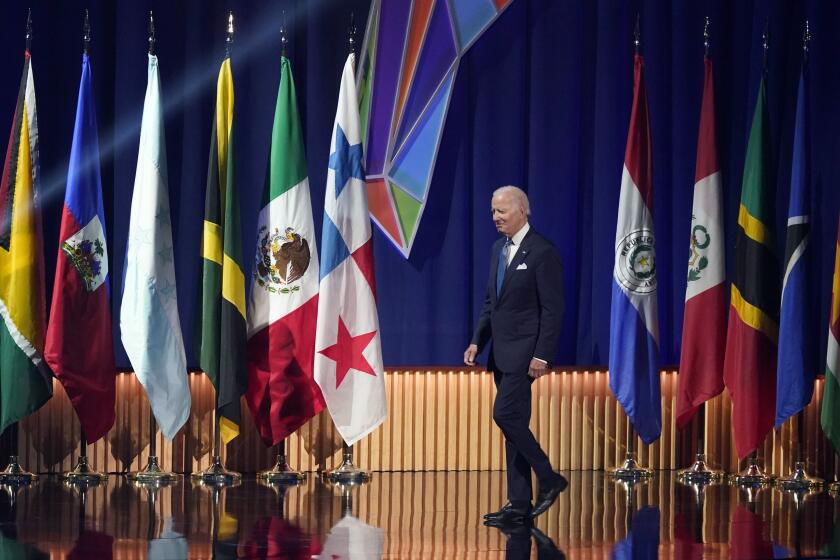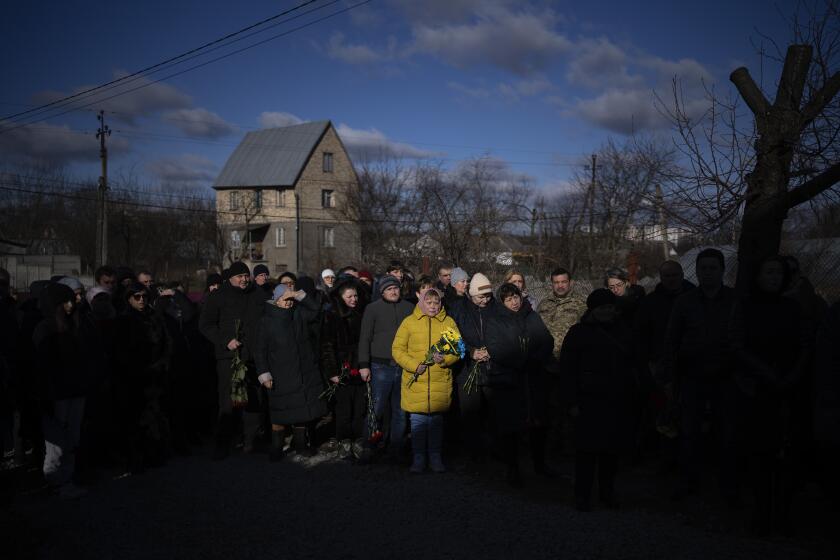With Ukraine aid in peril, Zelensky pleads his case on Capitol Hill and at the White House

- Share via
KYIV, Ukraine — His country’s future at stake, Ukrainian President Volodymyr Zelensky used inspirational words, optimistic resolve and a nod to Christmas in appealing Tuesday to leaders in Congress for U.S. aid for his fighters in the war with Russia.
But after hours of talks on Capitol Hill, additional American support appeared in grave doubt as Zelensky arrived at the White House to huddle with President Biden. The U.S. has already provided Ukraine $111 billion since Russian President Vladimir Putin launched his grinding invasion more than 21 months ago, but Republicans are insisting on linking any more money to strict U.S.-Mexico border security changes that Democrats decry.
The White House is warning that if new money isn’t provided by year’s end it will have swift consequences for Ukraine’s capacity to hold its territory, let alone take back land captured by Russia.
Biden, speaking at an early evening news conference with Zelensky, warned that failure by the United States to provide Ukraine further aid would embolden Putin and other aggressors on the world stage.
“Putin is banking on the United States failing to deliver on Ukraine,” Biden said. “We must, we must, we must prove him wrong.”
The Biden administration is warning Congress of the need to approve tens of billions of dollars in military and economic assistance to Ukraine.
Earlier meeting with Zelensky in the Oval Office, Biden called on Congress “to do the right thing, to stand with Ukraine, and to stand up for freedom.” He added, “Congress needs to pass the supplemental funding for Ukraine before they break for the holiday recess, before they give Putin the greatest Christmas gift they could possibly give him.”
Zelensky made his own case during his brief White House appearance with Biden and his private meetings with congressional leaders — that Ukrainian forces have fought fiercely to push back the Russian invasion with the help of American and other Western allies and it’s no time for Ukraine’s friends to step back.
“The fight we’re in is a fight for freedom,” Zelensky repeatedly said in the meetings on Capitol Hill, according to lawmakers.
Meanwhile, more than 130 senior lawmakers from across Europe signed a letter urging U.S. lawmakers to continue their support for Ukraine.
Flanked by Democratic Majority Leader Charles E. Schumer and Republican Minority Leader Mitch McConnell, Zelensky entered a private meeting with senators with a public bipartisan show of support and to some applause. But more than an hour later few senators’ minds appeared changed.
Ukraine’s president, Volodymyr Zelensky, talks about the winter campaign against Russia, the Israel-Hamas war, elections and domestic arms production.
Zelensky also visited the House leaders, including privately with new Speaker Mike Johnson, whose hard-right Republicans have been the most resistant to any deal. Johnson insisted afterward: “We do want to do the right thing here.”
Zelensky sought to impress on the senators that Ukraine could win the war against Russia, telling them he was drafting men in their 30s and 40s in a show of strength for the battle. In his trademark olive drab, he stood before a portrait of George Washington, history hanging behind him.
To the House Democrats, he showcased his country’s embrace of the West by pointing to the Christmas season, telling them it was the first year Ukraine would celebrate on Dec. 25 rather than the day Russians mark the holiday.
McConnell said Zelensky was “inspirational and determined” in the Senate meeting.
But Republican senators exited the meeting unmoved from their position. Sen. Markwayne Mullin of Oklahoma said the emergency funding wouldn’t gain GOP support unless it includes “real, meaningful border reform.”
Biden pushed back that “history will judge harshly those who turned their backs on freedom’s cause.” The president quoted a Kremlin-aligned television host celebrating Republicans’ recent blocking of aid as a job “well done.”
U.S. officials are trying to shore up NATO support for the Ukraine war effort without losing sight of the Israel-Hamas conflict.
“If you’re being celebrated by Russian propagandists, it might be time to rethink what you’re doing,” Biden said.
Biden has been calling for a $110-billion U.S. aid package for Ukraine, Israel and other national security needs.
He has expressed a willingness to engage with the Republicans as migrant crossings have hit record highs along the U.S.-Mexico border, but Democrats in his own party oppose proposals for expedited deportations and strict asylum standards as a return to Trump-era hostility toward migrants. Homeland Secretary Alejandro N. Mayorkas visited the Capitol to help with talks, but was not expected to be negotiating any deal.
One chief Republican negotiator, Sen. James Lankford of Oklahoma, said there was nothing Zelensky could say during his visit with the senators to sway the outcome.
“Hey, pay attention to us, but not your own country? No,” Lankford told reporters.
Ahead of Zelensky’s high-stakes meetings, the White House late Monday pointed to newly declassified intelligence that shows Ukraine has inflicted heavy losses on Russia in recent fighting along the Avdiivka-Novopavlivka axis — including 13,000 casualties and more than 220 combat vehicle losses. The Ukrainian holdout in the country’s partly occupied east has been the center of some of the fiercest fighting in recent weeks.
The U.S. and Europe, and the West’s allies, want Russia to pay a harsh economic price for invading Ukraine. But some elsewhere say: Not so fast.
U.S. intelligence officials have determined that the Russians think if they can achieve a military deadlock through the winter it will drain Western support for Ukraine and ultimately give Russia the advantage, despite the fact that Russians have sustained heavy losses and have been slowed by persistent shortages of trained personnel, munitions and equipment.
Russia has lost 87% of the military personnel it had before the Ukraine war, including contracted and other ground forces, naval infantry and airborne troops, according to a person familiar with a recently declassified intelligence analysis and granted anonymity to discuss it.
The result is forcing Russia to rely on Soviet-era weaponry and has set back efforts to modernize its ground forces, the person said the analysis shows.
It’s Zelensky’s third visit to Washington since the war broke out in February 2022, including a quick trip just a few months ago as aid was being considered. But his surprise arrival days before Christmas last December drew thunderous applause in Congress, his daring first wartime trip out of Ukraine.
At the time, lawmakers sported the blue-and-yellow colors of Ukraine, and Zelensky delivered a speech that drew on the parallels to World War II as he thanked Americans for their support.
But 2023 brought a new power center of hard-right Republicans, many aligned with Donald Trump, the former president who is now the GOP front-runner in the 2024 race for the White House.
While allies have rallied around Ukraine, President Biden’s broader foreign policy mission has delivered symbolism and summitry but little progress.
Republican Rep. Michael McCaul of Texas, the chairman of the House Foreign Affairs Committee, said Zelensky might be able to take on the stalemate by showing the stakes of potential Russian expansion toward the North Atlantic Treaty Organization, and making his case on “moral clarity and why is Ukraine important.”
Zelensky kicked off the quick visit to Washington on Monday, warning in a speech at a defense university that Russia may be fighting in Ukraine but its “real target is freedom” in America and around the world. During his meeting with Biden, he also sought to assure Congress — and the American public — that Ukraine was worth the substantial cost to the United States.
“Ukraine can win,” said Zelensky. “People need to be confident that freedom is secure.”
Of the new $110-billion national security package, $61.4 billion would go toward Ukraine — with about half to the U.S. Defense Department to replenish weaponry it is supplying, and the other half for humanitarian assistance and to help the Ukrainian government function with emergency responders, public works and other operations.
The package includes an additional nearly $14 billion for Israel as it fights Hamas and $14 billion for U.S. border security. Other funds would go for national security needs in the Asia-Pacific region.
Biden also announced Tuesday that he had approved an additional $200-million military aid package for Ukraine. Including that latest package, the U.S. now has about $4.4 billion remaining in weapons it can provide from department stockpiles.
As the Israel-Hamas war rages, Ukrainians worry that the world’s attention has swung away from their battle against Russia’s invasion.
Meanwhile on the battlefront, Ukraine came under heavy attack from the air and from cyberspace on Tuesday, local officials said, as nearly 600 Russian shells, rockets and other projectiles rained down on a southern region and unidentified hackers knocked out phone and internet services of the country’s biggest telecom provider.
Ukraine also claimed a successful hacker attack against Russia’s national tax system.
One person was killed and four others were wounded during 24 hours of Russian bombardment of Ukraine’s southern Kherson region, according to Oleksandr Prokudin, head of the regional military administration. The number of projectiles fired at Kherson was the highest in at least two weeks.
As winter sets in and hampers troop movements, allowing little change along the front line, air bombardment plays a growing role in the war.
Cyberattacks are also a busy battleground. Ukrainian telecom provider Kyivstar said it came under a “powerful” attack by hackers. The company serves more than 24 million mobile customers across the country.
“The war with Russia has many dimensions, and one of them is in cyberspace,” Kyivstar Director-General Oleksandr Komarov said in a statement.
The company didn’t estimate when services might be restored. It said its specialists were working with law enforcement agencies and special state services on solving the problem.
Associated Press writers Hanna Arhirova in Kyiv and Frank Bajak in Boston contributed to this report. Lolita Baldor, Tara Copp, Seung Min Kim, Will Weissert and Farnoush Amiri also contributed.
More to Read
Sign up for Essential California
The most important California stories and recommendations in your inbox every morning.
You may occasionally receive promotional content from the Los Angeles Times.
















